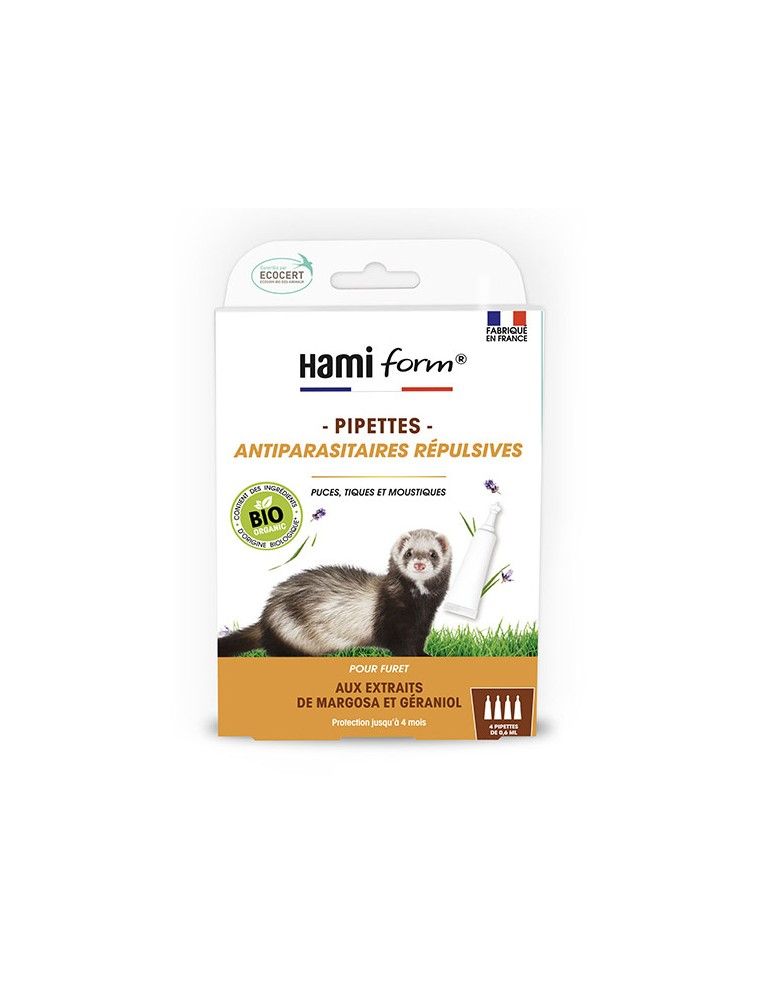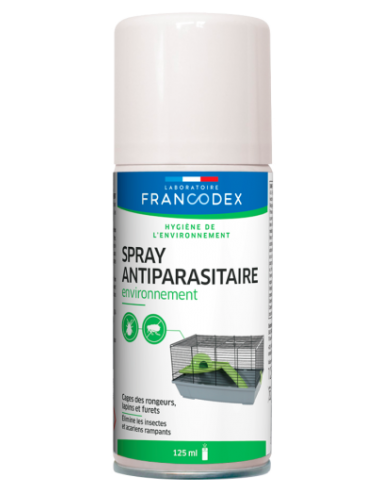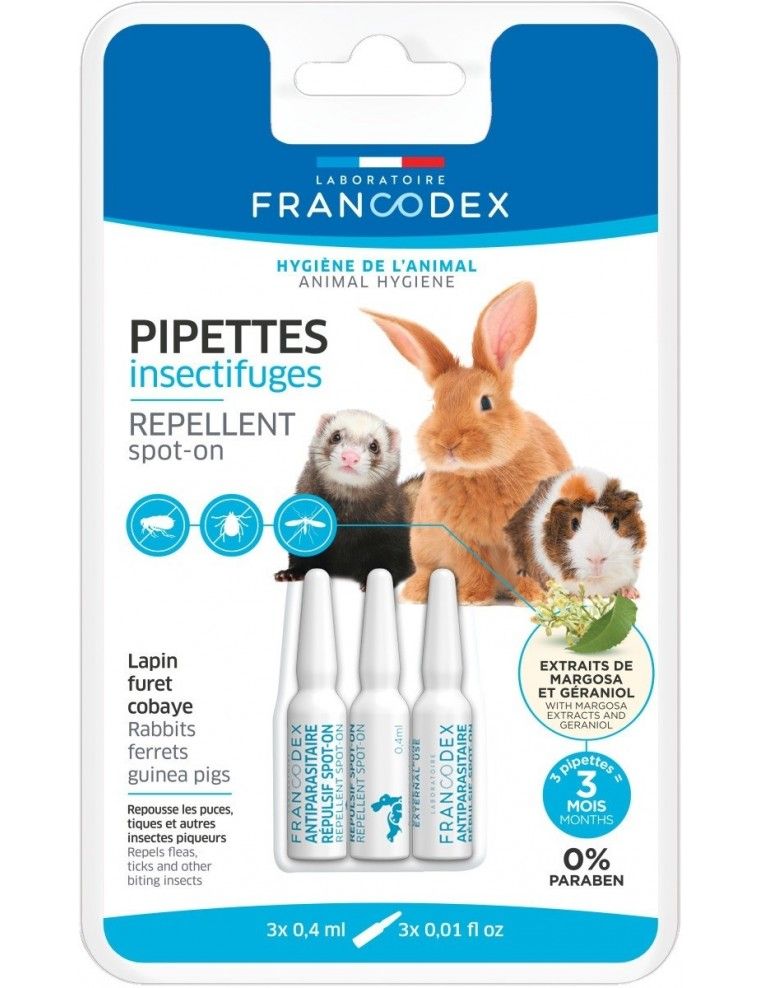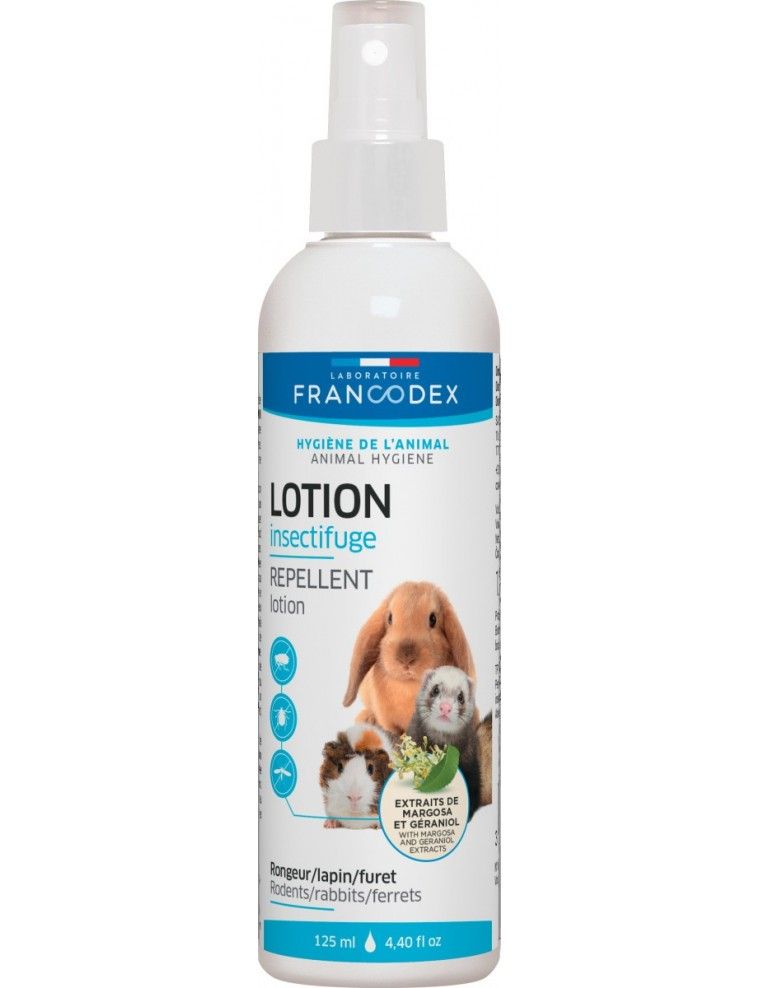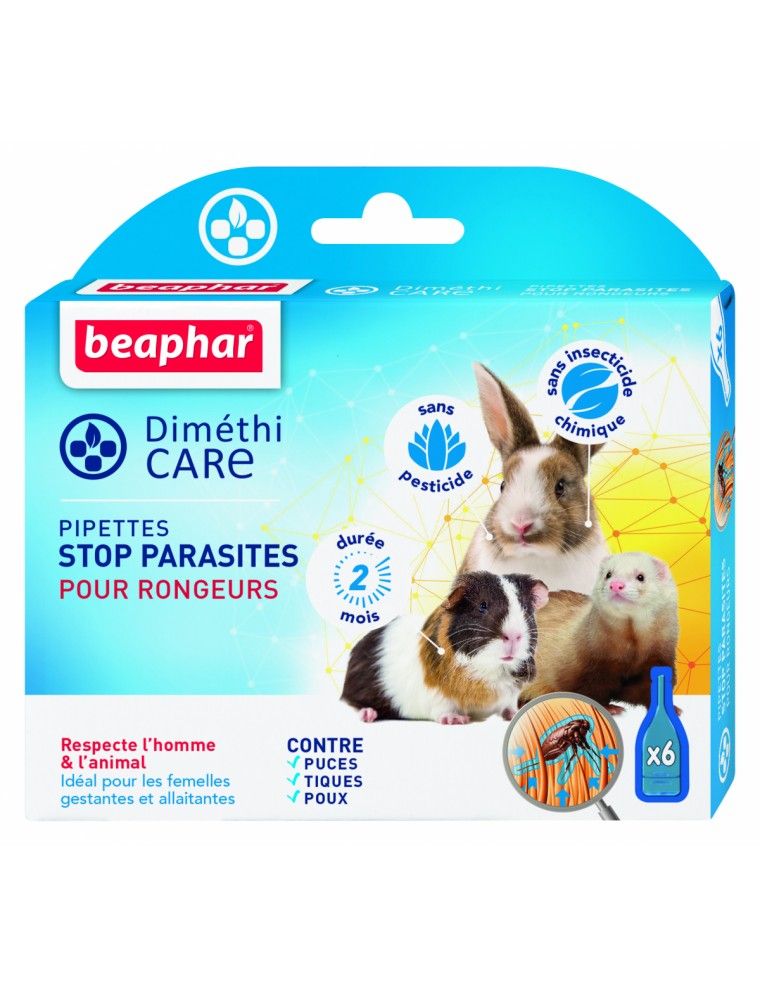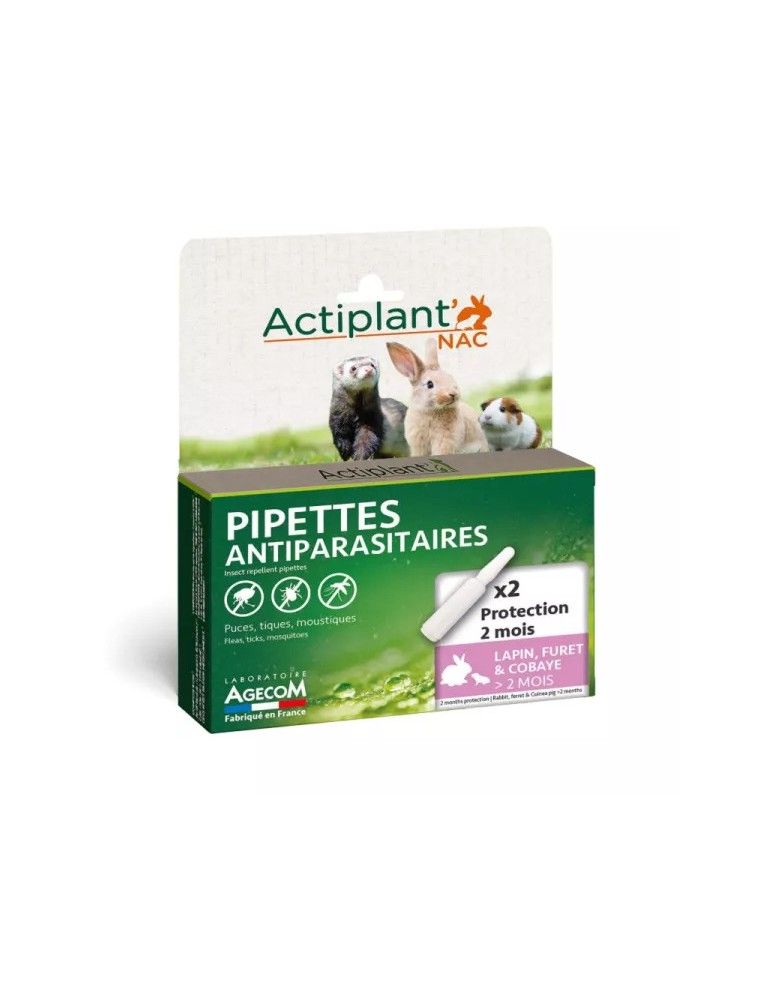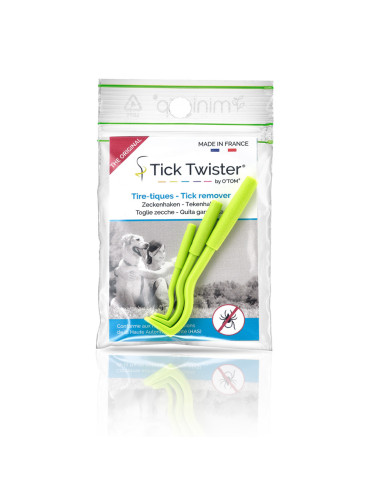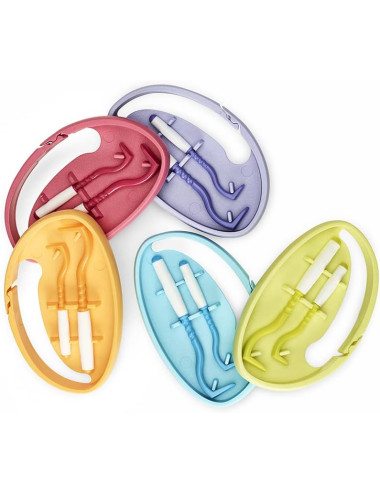- 4 in stock
Anti-parasitic Ferret
Protect your Ferret with our Anti-parasitics
Taking care of your precious Ferret is essential to ensure its well-being and health. At Le petit rodent, we understand how important your little companions are to you. That's why we offer you a careful selection of anti-parasitics for Ferrets, to help you protect your furry friend against fleas, ticks and other parasites. However, it is crucial to take certain precautions when using these products to ensure the safety of your Ferret.
The different types of anti-parasitics for Ferrets
Treating your Ferret for parasites can be done in several ways. You have the choice between pipettes, sprays or powders, as well as food supplements. Each of these options has its advantages and it is important to choose the one that best suits your Ferret.
- Pipettes: These small pipettes provide protection that lasts 3 to 4 weeks. All you have to do is apply them to your Ferret's skin at the nape of the neck, and the product will spread naturally throughout its body.
- Spray/powder: Sprays or powders are to be sprayed or sprinkled on your Ferret’s coat. You will need to reapply every 3 to 5 weeks. These products are effective in repelling insects and protecting your Ferret against bites or infestations.
- Antiparasitic supplement: If you prefer an internal solution, you can opt for antiparasitic food supplements. Simply add the powder directly to your Ferret's food, during times of risk of fleas and ticks.
- Antiparasitic for the cage: Do not neglect the hygiene of your Ferret's environment. Cage pest control products are effective in controlling crawling and flying insects. Spray them in the cage once cleaned, before putting back clean litter, for a healthy and protected environment.
Choosing the right anti-parasitic for your Ferret
Choosing the right anti-parasitic product for your Ferret depends on several criteria. Take into account the weight and age of your animal, the type of protection (internal or external: skin or dietary supplement) that you are looking for, the duration of protection desired, as well as the type of parasites to keep away. If you have any doubts, do not hesitate to seek advice from your veterinarian.
Protecting your Ferret against parasites is an essential step to guarantee its health and comfort. In addition to the risks of diseases transmissible to humans, such as leishmaniasis and Lyme disease, parasites can disturb the peace of your Ferret. At Le petit rodent, we are here to help you make the best choice for the protection of your faithful companion.
Anti-parasitic
Protect your Ferret with our Anti-parasitics
Taking care of your precious Ferret is essential to ensure its well-being and health. At Le petit rodent, we understand how important your little companions are to you. That's why we offer you a careful selection of anti-parasitics for Ferrets, to help you protect your furry friend against fleas, ticks and other parasites. However, it is crucial to take certain precautions when using these products to ensure the safety of your Ferret.
The different types of anti-parasitics for Ferrets
Treating your Ferret for parasites can be done in several ways. You have the choice between pipettes, sprays or powders, as well as food supplements. Each of these options has its advantages and it is important to choose the one that best suits your Ferret.
- Pipettes: These small pipettes provide protection that lasts 3 to 4 weeks. All you have to do is apply them to your Ferret's skin at the nape of the neck, and the product will spread naturally throughout its body.
- Spray/powder: Sprays or powders are to be sprayed or sprinkled on your Ferret’s coat. You will need to reapply every 3 to 5 weeks. These products are effective in repelling insects and protecting your Ferret against bites or infestations.
- Antiparasitic supplement: If you prefer an internal solution, you can opt for antiparasitic food supplements. Simply add the powder directly to your Ferret's food, during times of risk of fleas and ticks.
- Antiparasitic for the cage: Do not neglect the hygiene of your Ferret's environment. Cage pest control products are effective in controlling crawling and flying insects. Spray them in the cage once cleaned, before putting back clean litter, for a healthy and protected environment.
Choosing the right anti-parasitic for your Ferret
Choosing the right anti-parasitic product for your Ferret depends on several criteria. Take into account the weight and age of your animal, the type of protection (internal or external: skin or dietary supplement) that you are looking for, the duration of protection desired, as well as the type of parasites to keep away. If you have any doubts, do not hesitate to seek advice from your veterinarian.
Protecting your Ferret against parasites is an essential step to guarantee its health and comfort. In addition to the risks of diseases transmissible to humans, such as leishmaniasis and Lyme disease, parasites can disturb the peace of your Ferret. At Le petit rodent, we are here to help you make the best choice for the protection of your faithful companion.
- in replenishment
- 12 in stock
- 2 in stock
- in replenishment
- in replenishment
- 20 in stock
- 4 in stock
Questions / Réponses
Utilisez des antiparasitaires spécifiquement formulés ou approuvés pour les furets. Les produits à base de selamectine, de fipronil, ou d'imidaclopride sont souvent recommandés par les vétérinaires. Évitez les produits destinés aux chiens et aux chats sans l'approbation d'un vétérinaire.
La fréquence dépend du produit utilisé et du niveau d'exposition aux parasites. En général, un traitement mensuel est recommandé pour la prévention des puces et des tiques. Suivez les instructions du fabricant ou les recommandations de votre vétérinaire.
Appliquez le traitement directement sur la peau, à la base du cou ou entre les omoplates, où votre furet ne peut pas le lécher. Assurez-vous que la peau est sèche et que le furet reste au sec pendant au moins 24 heures après l'application.
Certains produits destinés aux chiens et aux chats peuvent être utilisés sur les furets, mais uniquement sous supervision vétérinaire. La tolérance et le dosage peuvent varier, rendant certains produits dangereux pour les furets.
Bien que certains remèdes naturels soient considérés comme moins agressifs, leur efficacité n'est pas toujours prouvée. Discutez avec votre vétérinaire des options sûres et efficaces, comme l'huile de neem ou les extraits de certaines plantes.
Les antiparasitaires pour furets ciblent principalement les puces, les tiques, et les acariens responsables de la gale. Certains produits peuvent également prévenir les vers du cœur et traiter les infestations par les vers intestinaux.
Si vous observez des signes de réaction allergique (comme une irritation cutanée, des démangeaisons, de l'agitation ou des difficultés respiratoires), contactez immédiatement un vétérinaire. Il pourra fournir un traitement approprié et conseiller sur les alternatives.
Oui, même les furets vivant principalement à l'intérieur peuvent être exposés aux parasites par le biais de l'homme, d'autres animaux, ou de l'environnement. Un traitement préventif est conseillé pour tous les furets.
Choisissez un produit recommandé par votre vétérinaire et spécifiquement indiqué pour l'usage sur les furets. Considérez le spectre d'action, la facilité d'application, et les éventuelles sensibilités de votre animal.
Oui, pour une lutte efficace contre les parasites, il est recommandé de traiter tous les animaux domestiques de la maison. Cela aide à prévenir la transmission croisée des parasites entre animaux.
